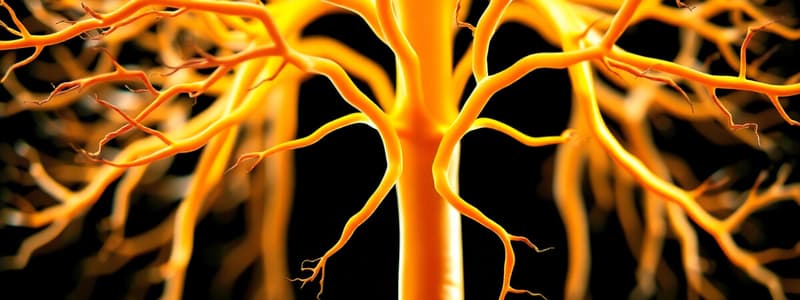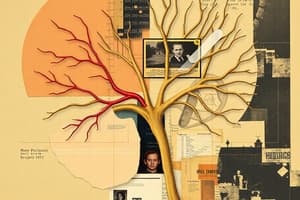Podcast
Questions and Answers
What is the primary role of Schwann cells in the nervous system?
What is the primary role of Schwann cells in the nervous system?
- Help the body interact with the environment (correct)
- Transmit sensory information directly to the brain
- Support the cell bodies of neurons in the ganglion
- Facilitate communication between interneurons
Which of the following correctly describes the dorsal root ganglion?
Which of the following correctly describes the dorsal root ganglion?
- Contains multipolar neurons
- Contains motor neuron cell bodies
- Found in the central nervous system
- Associated with pseudounipolar neurons (correct)
What is the function of satellite cells in the peripheral nervous system?
What is the function of satellite cells in the peripheral nervous system?
- Conduct electrical impulses along axons
- Provide support to the cell bodies of the ganglion (correct)
- Facilitate synaptic transmission between neurons
- Mediate the stress response in the body
How many pairs of spinal nerves are present in the human body?
How many pairs of spinal nerves are present in the human body?
Which division of the peripheral nervous system provides motor innervation of the skeletal muscles?
Which division of the peripheral nervous system provides motor innervation of the skeletal muscles?
What is the primary function of neurons in the frontal lobe?
What is the primary function of neurons in the frontal lobe?
Which anatomical part of the neuron is primarily responsible for receiving information?
Which anatomical part of the neuron is primarily responsible for receiving information?
What happens to information transmission if acetylcholine is blocked?
What happens to information transmission if acetylcholine is blocked?
What role does myelin play in the nervous system?
What role does myelin play in the nervous system?
In which condition does the body destroy its own myelin?
In which condition does the body destroy its own myelin?
What is the cell body of a neuron also known as?
What is the cell body of a neuron also known as?
How are neurons classified based on morphology?
How are neurons classified based on morphology?
Which statement about glial cells is accurate?
Which statement about glial cells is accurate?
What are the two main parts of the nervous system?
What are the two main parts of the nervous system?
Which part of the nervous system consists of the brain and spinal cord?
Which part of the nervous system consists of the brain and spinal cord?
What is the primary role of oligodendrocytes in the nervous system?
What is the primary role of oligodendrocytes in the nervous system?
What components constitute the brainstem?
What components constitute the brainstem?
Which of the following is NOT a major division of the Central Nervous System?
Which of the following is NOT a major division of the Central Nervous System?
What function does cerebrospinal fluid (CSF) serve?
What function does cerebrospinal fluid (CSF) serve?
Which structure is responsible for the production of myelin in the CNS?
Which structure is responsible for the production of myelin in the CNS?
Which division of the Central Nervous System is responsible for higher cognitive functions?
Which division of the Central Nervous System is responsible for higher cognitive functions?
Flashcards
Ependymal Cells
Ependymal Cells
Specialized cells lining the ventricles in the brain and central canal of the spinal cord. They contribute to the production and circulation of cerebrospinal fluid (CSF).
Cerebrospinal Fluid (CSF)
Cerebrospinal Fluid (CSF)
A clear fluid that circulates within the ventricles of the brain and around the spinal cord. It provides cushioning, nutrient transport, and waste removal for the nervous system.
Central Nervous System (CNS)
Central Nervous System (CNS)
The control center of the body, consisting of the brain and spinal cord. It receives sensory information, processes it, and sends out motor commands.
Peripheral Nervous System (PNS)
Peripheral Nervous System (PNS)
Signup and view all the flashcards
Brain Stem
Brain Stem
Signup and view all the flashcards
Cerebral Hemispheres
Cerebral Hemispheres
Signup and view all the flashcards
Thalamus
Thalamus
Signup and view all the flashcards
Hypothalamus
Hypothalamus
Signup and view all the flashcards
Schwann cell
Schwann cell
Signup and view all the flashcards
Satellite cells
Satellite cells
Signup and view all the flashcards
Dorsal root
Dorsal root
Signup and view all the flashcards
Ventral root
Ventral root
Signup and view all the flashcards
Ganglion
Ganglion
Signup and view all the flashcards
What is the functional unit of the nervous system?
What is the functional unit of the nervous system?
Signup and view all the flashcards
What does the cell body of a neuron contain?
What does the cell body of a neuron contain?
Signup and view all the flashcards
Nissl bodies
Nissl bodies
Signup and view all the flashcards
What is the function of dendrites?
What is the function of dendrites?
Signup and view all the flashcards
What is the function of the axon?
What is the function of the axon?
Signup and view all the flashcards
What does acetylcholine do?
What does acetylcholine do?
Signup and view all the flashcards
What is myelin?
What is myelin?
Signup and view all the flashcards
What is multiple sclerosis?
What is multiple sclerosis?
Signup and view all the flashcards
Study Notes
Neurons and the Nervous System
- Neurons are the functional units of the nervous system, communicating via synapses.
- Neurons consist of a cell body (soma), axon, and dendrites.
- Dendrites receive information, while axons transmit signals to other neurons.
- Myelin insulates axons, increasing the speed of signal transmission.
- Diseases like multiple sclerosis destroy myelin, impairing signal transmission.
- Axon damage can lead to paralysis.
- Neurotransmitters like acetylcholine are released at axon terminals to transmit signals to other neurons.
Types of Neurons
- Neurons are categorized by morphology:
- Bipolar neurons have one axon and one dendrite connected to the cell body. Found in sensory systems like the olfactory epithelium and retina.
- Unipolar/pseudounipolar neurons have a single process that branches from the cell body. Primarily sensory neurons.
- Multipolar neurons have multiple dendrites and one axon; the most prevalent neuron type.
Glial Cells
- Glial cells support neurons, providing structure and metabolic function.
- Glial cells in the central nervous system (CNS) include:
- Oligodendrocytes produce myelin in the CNS.
- Astrocytes maintain the blood-brain barrier and aid in cellular repair.
- Microglia act as macrophages, performing immune functions.
- Ependymal cells produce cerebrospinal fluid (CSF).
- Glial cells in the peripheral nervous system (PNS) include:
- Schwann cells have similar functions to oligodendrocytes, producing myelin in the PNS.
- Satellite cells support the cell bodies of the ganglia.
Organization of the Nervous System
- The nervous system is divided into the central nervous system (CNS) and peripheral nervous system (PNS).
- The CNS is composed of the brain and spinal cord.
- The brain contains: cerebral hemispheres, diencephalon (thalamus and hypothalamus), midbrain, pons, cerebellum, and medulla.
- The spinal cord connects the brain to the body's periphery.
- The peripheral nerves transmit sensory and motor information to and from the CNS to the body.
Autonomic Nervous System
- The autonomic nervous system controls involuntary functions like glandular activity and smooth muscle actions.
- Composed of two branches:
- Sympathetic division is activated during "fight-or-flight" responses and increases activity.
- Parasympathetic division is activated during "rest-and-digest" responses. Promotes relaxation and lowers activity.
Somatic Nervous System
- Controls voluntary movements of skeletal muscles.
- Transmits sensory or motor information to/from the skeletal muscles that allow for voluntary actions.
Spinal nerves
- There are 31 pairs of spinal nerves, branching off the spinal cord to interact with the body.
Clinical Correlates
- Imaging techniques like CT scans and MRI are used for diagnosing brain issues.
- Ischemic stroke is a major cause of death.
- Blood clots in arteries in the brain can cause a stroke by blocking oxygen and nutrients to brain cells resulting in cell death.
- Red neurons indicate ischemic damage
- Patient history, signs, and symptoms can help determine patient diagnosis and treatment.
Studying That Suits You
Use AI to generate personalized quizzes and flashcards to suit your learning preferences.




